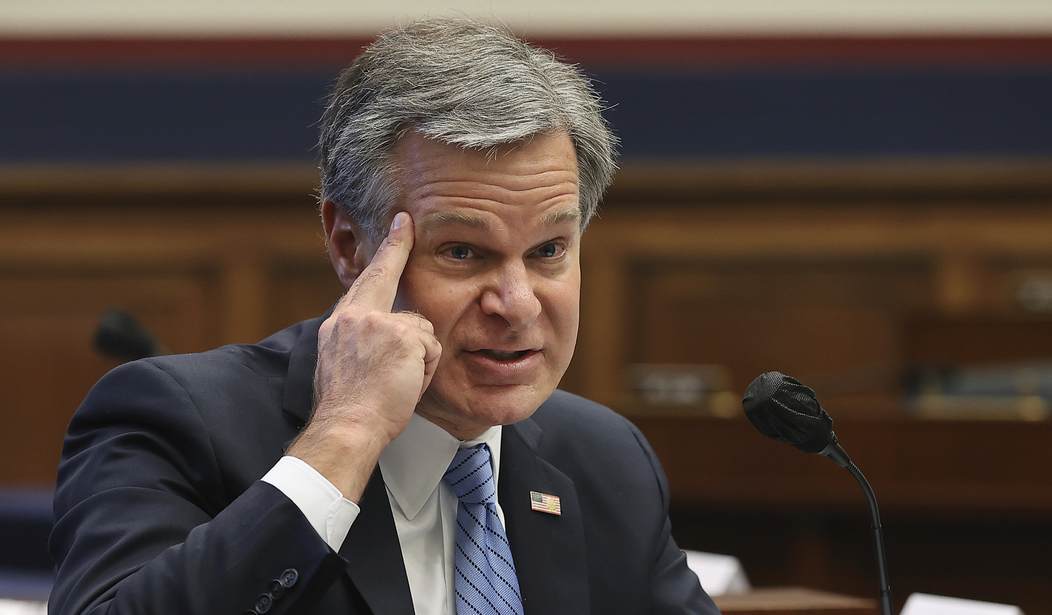He certainly will be, whether he wants to leave or not. At least Christopher Wray has decided to prepare for that inevitability, rather than operate on the absurd assumption that presidents cannot remove political appointees under their jurisdiction in an at-will employment situation.
Kerry Picket had the scoop two days ago at the Washington Times, but as I wrote on Monday, the writing was on the wall. Wray will leave to allow Donald Trump to appoint a successor, but naturally the Washington Post gets this wrong:
FBI Director Christopher A. Wray announced he would resign from his position at the end of the Biden administration, stepping down as the leader of the 35,000-person law enforcement bureau before President-elect Donald Trump takes office and can fire him.
Wray’s resignation comes seven years into his 10-year term — a tenure that is meant to span multiple administrations and is intentionally longer than other executive branch appointments to avoid politicization of the FBI. Trump announced last month that he would nominate loyalist Kash Patel to serve as FBI director, sending a message to Wray that he should either resign or prepare to be fired.
Ahem. In the first place, the ten-year term does not ensure that an FBI director will serve multiple administrations. It's in place to make sure that any one person serves no longer than ten years, a change that Congress created after J. Edgar Hoover finally died after running the FBI like his own private political operation for five decades. It's a limit, not an enabling statute.
Besides which, Wray did serve multiple administrations. So?
Presidents appoint this position, and like all presidential positions, those officers only hold their jobs at the pleasure of the current president. That's just as true of Wray's position as it is of the Attorney General, whose position is superior to his. It's just as true of other DoJ positions appointed by the president, including and especially US Attorneys. Whether Congress grants them a specific "term" in office is immaterial; they are at-will employees of POTUS and not civil servants.
And you know who made sure of that status? Joe Biden:
Thanks in part to a court fight former Trump White House spokesman Sean Spicer lost over his firing by Biden from a three-year term to the Board of Visitors to the United States Naval Academy, the incoming president will have the legal backing to dump any of Biden’s over 4,000 appointments who try to stick around.
And the best part, Spicer told Secrets, “They’ll have no one to blame but Biden himself.” ...
Spicer and others, including Russ Vought (just picked by Trump to head the Office of Management and Budget) and former Trump counselor Kellyanne Conway, were unceremoniously dumped despite several of them having time left on their three-year terms.
Spicer and Vought sued, saying that unlike White House staff or others appointed by a prior president, they couldn’t be fired because of their congressionally mandated terms.
They lost, however, when a judge essentially ruled that the president could fire any presidential appointee, whether they had terms or not. A further effort failed, too.
Spicer later said that he wanted to establish that principle in case Trump won re-election at some point. Whether or not that's true, the principle already existed and has been the norm ever since the end of the spoils system and the creation of the civil-service system. Those whom presidents appoint, presidents can unseat.
Wray certainly knows this, even if Democrats pretend that they don't. That's why Wray deserves some credit here for operating on a realistic basis. Rather than spend the next several weeks hanging around and then suing to keep his job through 2027, he's choosing to allow a transition to new leadership. Wray briefed the FBI so that they were aware of his decision and could begin to prepare rationally for that handover, rather than either abruptly quitting now or insisting that a president couldn't remove him. (Of course, if that were true, Wray wouldn't have been FBI director in the first place; he only got the job because Trump fired James Comey.)
Wray doesn't deserve massive kudos for grasping reality, but at least he's choosing to exit as gracefully as possible under the circumstances. Maybe he can serve as a legal analyst to the Washington Post and teach their reporters a little bit about law and government.








Join the conversation as a VIP Member